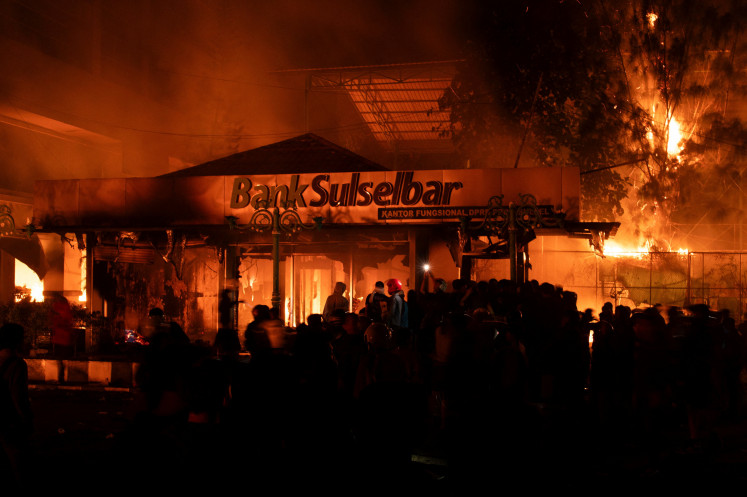Popular Reads
Top Results
Can't find what you're looking for?
View all search resultsPopular Reads
Top Results
Can't find what you're looking for?
View all search resultsWith a daytime population of 12 million, Jakarta is overpopulated
The city administration said that Jakarta is close to being overpopulated and swift actions are needed to rein in the impending population boom
Change text size
Gift Premium Articles
to Anyone
T
he city administration said that Jakarta is close to being overpopulated and swift actions are needed to rein in the impending population boom.
City Population and Civil Registration Agency head Purba Hutapea said that during the day Jakarta is home to more than 12 million people, only half a million short of the 12.5 million population projected in the new 2010-2030 Spatial Planning bylaw.
“The official figure for Jakarta population is 9.6 million people, but with the addition of 2.5 million from the suburbs of Jakarta coming to work every day, the city is already overloaded,” Purba said on Friday.
The Jakarta administration and the City Council have agreed to limit the population of the capital to no more than 12.5 million by 2030, as stipulated in 2010-2030 Spatial Planning Bylaw.
Purba, however, said that the city could still meet its target of limiting the population to 12.5 million.
“The major factor affecting population growth in the city is migration from other regions and it has been on a steady decline over the past few years,” Purba said.
To limit migration from other regions in the country, the city administration plans to crack down on new arrivals in the city three weeks after the Idul Fitri holiday.
Neighborhoods targeted in the operation include Kebayoran Lama and Pasar Minggu in South Jakarta, Cakung in North Jakarta and Tambora in West Jakarta.
During clampdown operations public order officers will also target boarding houses and apartments in the city.
Public order officers will ask newcomers to show their ID cards, travel documents and the addresses of their employers, which would indicate that they already had secured jobs in the city.
Data from the Population and Civil Registration Agency show that there were 109,617 post-holiday newcomers in 2007, 88,473 in 2008, 69,554 in 2009 and 60,000 last year.
Jakarta expects to see less than 50,000 new arrivals this year.
The city has also claimed success in its family planning programs as indicated by lower birth rates, growth of which now hovers around 1.1 percent to 1.2 percent per year.
The latest national census in 2010 put the city population at 9.58 million, with an annual growth of 1.4 percent, or 135,000 people per year.
The current population figure exceeds the 8.9 million mark predicted by the Central Statistic Agency in 2010.
The current figure also surpasses the city’s own projection for 2025, which was forecast to be 9.2 million.
With its current population, Jakarta’s 662-square-kilometer area has a population density of 14,476 people per square kilometer.
Bandung Institute of Technology urban expert Tommy Firman said that mass urbanization was inevitable as long as Jakarta remained the country’s primary economic center.
“The central government needs to develop the regions, creating new economic centers and distributing wealth proportionately,” Tommy told The Jakarta Post on Friday.
He said for the time being, Jakarta could handle its population boom by cooperating with satellite cities to create new economic centers in Jakarta’s suburban areas.
The population of Greater Jakarta, which comprises Jakarta, Bogor, Depok, Tangerang and Bekasi (Jabodetabek), reached 27.9 million according to the 2010 national census, with a growth rate of 3.6 percent per annum over the 2000-2010 period.
That figure far exceeds the national annual population growth rate of 1.49 percent per year over the same period. Jabodetabek accounts for 11 percent of Indonesia’s population, up from 10 percent in the previous census in 2000.










